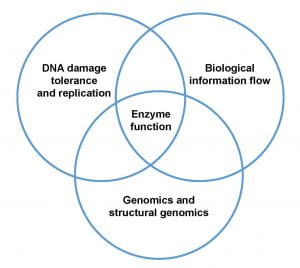Research
The Beuning laboratory at Northeastern is focused on understanding the structure-function-dynamics relationships of proteins and enzymes, with a particular focus on proteins involved in DNA metabolism and DNA damage tolerance.

Our goals are to understand cellular responses to genotoxic stress. All organisms experience damage to their genetic material from environmental and endogenous sources. Multiple redundant systems exist to identify and remove damaged bases from DNA in organisms from bacteria to humans. For example, the bacterial SOS response, involving the upregulation of at least 40 genes in E. coli, is induced when cells experience damage to their DNA and other stresses. Many of the genes induced as part of the SOS response are responsible for DNA repair and cell cycle regulation. Another group of genes induced as part of the SOS response, encoding Y-family DNA polymerases, play a role in tolerance to DNA damaging agents at a potentially mutagenic cost.
DNA damage tolerance by Y-family DNA polymerases: The Y family DNA polymerases are specialized DNA polymerases that are able to replicate a wide array of damaged DNA substrates, including thymine-thymine dimers, nucleotide base adducts, and abasic sites. The presence of Y family polymerases in cells confers resistance to several classes of DNA damaging agents and environmental toxins. A major focus of our research is to understand the specificity of these DNA polymerases for their damaged DNA substrates using protein engineering, molecular modeling and chemical synthesis.
Replication protein dynamics and interactions: Another focus of our research is to understand the protein dynamics and protein-protein interactions that regulate DNA damage responses and DNA replication. This work focuses on the inherent dynamics of processivity clamps, working with the Korzhnev group at UCONN Health, as well as interactions with single-stranded DNA binding protein and the SOS-induced protein UmuD.
Remote residue participation in enzyme activity: In collaboration with the Ondrechen research group, we probe the effects of active site and remote residues in enzyme activity using computational predictions made by Ondrechen group methods. We determine the effects of mutations of residues predicted to contribute to activity using enzyme kinetics and biophysical methods. In our lab, these methods have been applied to both Y-family and replicative DNA polymerases as well as enzymes involved in central metabolism and amino acid and nucleic acid metabolism.
Assigning enzyme function: Also working with the Ondrechen group, we aim to assign function experimentally to enzymes of unknown or likely incorrectly assigned function. This work takes advantage of computed chemical properties of residues that contribute to activity to develop a chemical signature for each functional family or sub-family. We then experimentally characterize protein function to assign them to the correct functional family.